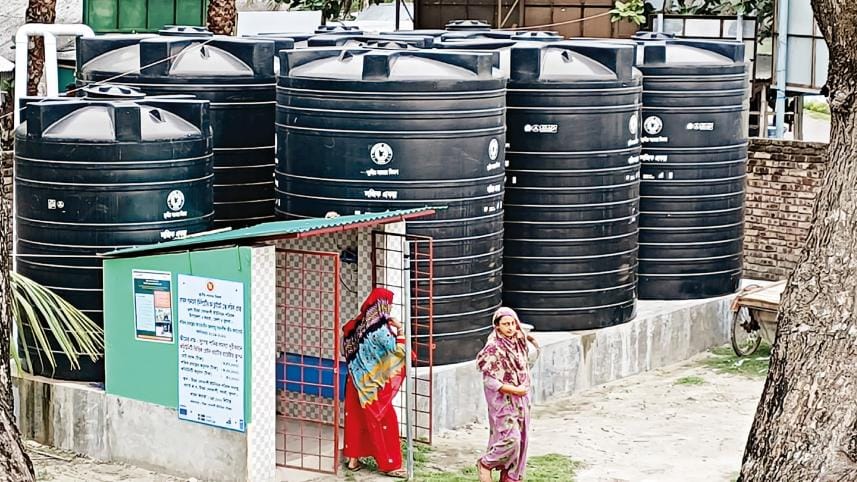Climate resilience through local empowerment

Rikta Roy knows firsthand the devastating effects of climate change on coastal communities. Living in Dacope, one of the worst climate-affected areas in Bangladesh, she has experienced increased storms, cyclones, and salinity levels that have disrupted her livelihood over the years. Despite starting a small poultry farm with hopes of generating income, Rikta's dreams were shattered by Cyclone Amphan in May 2020, which swept away the farm.
Coastal women like Rikta are particularly vulnerable to the adverse impacts of climate change, often falling into a vicious cycle of poverty and vulnerability. The Local Government Initiative on Climate Change (LoGIC) project stepped in to break this cycle. Through the project, most climate-vulnerable women in Dacope Upazila, including Rikta, were given direct financial support to undertake climate adaptive livelihoods. With this fund, Rikta and her fellow climate-vulnerable women have been able to invest in watermelon cultivation, which now not only generates income but also serves as a beacon of hope for their future.

Throughout the process, the LoGIC project provided comprehensive support to these women, covering everything from planning and financing to developing climate-adaptive business models, leasing land, providing training on watermelon cultivation, creating access to financial institutions, and ultimately establishing market linkages to ensure that they receive fair value for their produce.
The LoGIC is a multi-donor collaborative initiative of Bangladesh Government, UNDP, UNCDF, EU and Sweden. Its primary aim is to empower and equip vulnerable communities, civil society organisations (CSOs), and Local Government Institutions (LGIs) to plan and finance sustainable climate change adaptation solutions in areas most affected by climate change. The Local Government Division (LGD) is the leading implementing partner for the project, working closely with UNDP and UNCDF.
"Besides the primary goal to reduce climate change impacts, the LoGIC project aims to eradicate the adaptation gap. Most of the efforts taken so far to address the impacts of climate change have been coping mechanisms, but adaptation strives for long-term resilience building through various actions," says A K M Azad Rahman, Project Coordinator, LoGIC project, UNDP.
Since July 2017, this project has been implemented in seven severely climate-vulnerable districts in Bangladesh- Khulna, Sunamganj, Kurigram, Bagerhat, Barguna, Patuakhali and Bhola. The 6-year-long LoGIC project is designed to support the most climate-vulnerable people through two financing schemes -- Community Resilience Fund (CRF) and Performance Based Climate Resilience Grants (PBCRG).
"While CRF is dedicated to support women for building climate adaptive livelihoods, PBCRG is used by the Union Parishads for building climate adaptive infrastructure," shares Jesmul Hasan, Country Focal, UNCDF Bangladesh.
The watermelon cultivation initiative received funding under the Community Resilience Fund (CRF) scheme of the LoGIC project. Other 23 types of successful climate adaptive livelihood options (CALOs) covered under the scheme include vermicomposting, integrated farming, duck rearing, fish polyculture and climate-resilient sheep rearing. To date, the LoGIC project has supported 35,000 climate-vulnerable women, and the number of beneficiaries is expected to increase in the future.
The initiatives funded under the Performance Based Climate Resilience Grants (PBCRG) scheme of LoGIC have also brought about many life-changing stories.
In the coastal Bagerhat District's Morelganj Upazila, for example, the residents of Nishanbari Union were grappling with increased salinity intrusion in the area, leading to a shortage of drinking water. Recognising the severity of the crisis, the Union Parishad, with support from the LoGIC project, established an integrated water management plant to ensure safe drinking water for the saline-stricken community.
"This is the only water treatment plant in the community that provides pure drinking water to the 500 families who have been suffering for the last two decades. We were closely involved in this initiative and provided voluntary support during its implementation," says Fozila Begaum, a resident of Nishanbari Union.
LoGIC supported 72 Union Parishads with PBCRG to implement 639 climate-resilient community level schemes which benefitted 898,449 people. The PBCRG schemes include climate resilient water and sanitation facility, solar-powered irrigation system, providing safety equipment to sea-going fishing boats, lightning/flood shelter, improved accessibility to cyclone shelters, vetiver & mangrove plantation and establishing community clinics and market sheds.
What sets the LoGIC project apart from other climate responses in Bangladesh is its Locally-led Adaptations (LLA) approach. Globally recognised as the most effective adaptation approach, LLA leverages local knowledge, ensures community participation, and empowers them to take ownership of the development initiative.
Investing in locally-led climate change adaptation projects can make a significant difference in vulnerable countries like Bangladesh, as demonstrated by the promising results of the LoGIC project. It has provided safety measures, strengthened climate adaptive infrastructure, and created livelihood opportunities. The real challenge now is to scale up the project.
According to A K M Azad Rahman, the project coordinator for LoGIC, the project will be tested in the Chittagong Hill Tracts for the next two years with the aim of expanding it to the national level.
Sarah Bintay Shakhawat is a journalist at The Daily Star.



 For all latest news, follow The Daily Star's Google News channel.
For all latest news, follow The Daily Star's Google News channel.
Comments